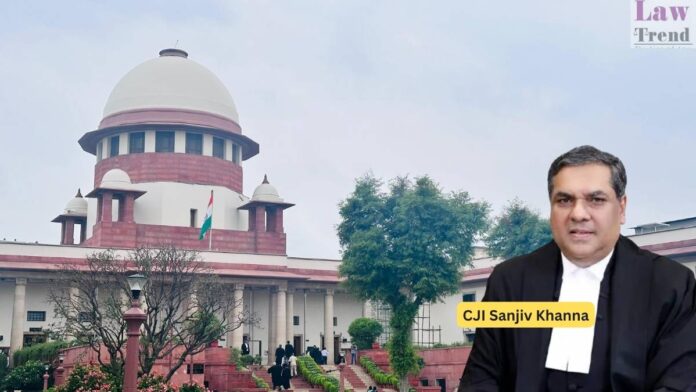Chief Justice of India Sanjiv Khanna concludes his tenure on Tuesday, marking the end of a brief yet impactful leadership at the Supreme Court. Justice Khanna, who held the top judicial post for around seven months, presided over several landmark decisions that underscored constitutional values such as secularism, individual liberty, and judicial transparency. He will be succeeded by Justice Bhushan Ramkrishna Gavai, who takes oath on May 14 as the 52nd Chief Justice of India.
Upholding Secularism and Socialist Ideals
One of the most significant judgments delivered under CJI Khanna came on November 25, 2024, when the Supreme Court dismissed a plea challenging the inclusion of the words “secular” and “socialist” in the Preamble of the Constitution during the Emergency through the 42nd Amendment in 1976. The Bench led by Justice Khanna observed that Parliament has the power to amend the Constitution, including the Preamble. Importantly, the Court held:
“Secularism is a basic feature of the Constitution… it represents an aspect of the right to equality and is deeply woven into the constitutional fabric.”
Intervention in Religious Site Disputes
Amidst a rise in communal tensions due to litigation over mosques allegedly built on temple remains, the Supreme Court under CJI Khanna stepped in decisively in late 2024. He ordered that no new petitions concerning religious sites be entertained and barred lower courts from issuing fresh survey orders or interim/final reliefs. This helped restore status quo and prevent escalation of communal discord.
Tackling Judicial Controversies Transparently
Justice Khanna dealt firmly with controversies involving High Court judges. He ordered swift inquiries into two notable cases—Justice Shekhar Kumar Yadav’s remarks at a VHP event and the recovery of unexplained cash from Justice Yashwant Varma’s official residence. In both cases, he ensured transparency and accountability through in-house committees.
Mandatory Disclosure of Judges’ Assets
Taking a significant step towards transparency, Justice Khanna led a Full Court meeting on April 1, 2025, where the Supreme Court unanimously resolved that all judges would publicly disclose their assets. This move institutionalizes asset declarations and sets a precedent for continued transparency in the judiciary.
Defending Civil Liberties and Due Process
Justice Khanna’s tenure was marked by his strong stance on protecting personal liberty. In the Radhika Agarwal case, he curbed the misuse of arrest powers under the GST and Customs Acts. He also warned the Uttar Pradesh Police against converting civil disputes into criminal cases, stating:
“Criminal proceedings for civil wrongs are impermissible and violate multiple judicial precedents.”
Transparency in Collegium Recommendations
Amid accusations of nepotism in judicial appointments, CJI Khanna publicly released all Collegium recommendations sent to the Central Government in the last three years. The disclosures included data on caste, gender, minority status, and whether nominees were related to sitting or retired judges.
Interim Relief in Waqf Amendment Dispute
Justice Khanna also played a key role in diffusing tension around the controversial Waqf Amendment Act. By signalling the Court’s inclination to stay certain provisions, he prompted the Centre to declare that no Waqf property would be denotified for the time being and no fresh appointments would be made to the Waqf Boards or the Central Waqf Council.
Ending Preferential Treatment for Senior Advocates
One of the longstanding criticisms of the Supreme Court has been the preferential treatment given to senior lawyers. Justice Khanna ended the practice of oral mentions for early listing of cases. He insisted that even senior advocates must submit listing requests in writing through the proper registry channels, enforcing procedural equality in court functioning.
Participation in Other Major Rulings
Justice Khanna was a member of several historic Benches:
- He upheld the abrogation of Article 370.
- He co-authored the judgment declaring the Electoral Bond Scheme unconstitutional.
- He reaffirmed the integrity of Electronic Voting Machines (EVMs).
Legacy of Justice HR Khanna Continues
Justice Sanjiv Khanna is the nephew of the legendary Justice HR Khanna, who is remembered for his lone dissent in the ADM Jabalpur case during the Emergency. Justice HR Khanna’s dissent upheld the inalienable nature of Article 21 (right to life and liberty), even during times of national crisis. His principled stand cost him the Chief Justiceship, leading to his resignation in protest. In 2017, a nine-judge Constitution Bench overturned the majority opinion in ADM Jabalpur, vindicating Justice HR Khanna’s dissent.
Judicial Career and Background
Born on May 14, 1960, Justice Sanjiv Khanna studied law at Delhi University’s Campus Law Centre and began his legal practice in Delhi. He was appointed as a judge of the Delhi High Court in 2005 and elevated to the Supreme Court in January 2019. As the 51st Chief Justice of India, his short but impactful tenure will be remembered for restoring faith in constitutional values and judicial integrity.




